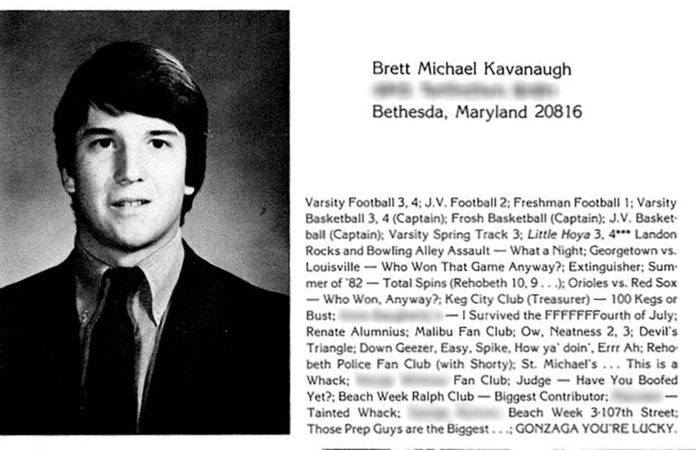I have but a few weeks left to choose a senior quote for the Chapel Hill yearbook, Hillife. I know it’s not that important, in the grand scheme of life and all, but it’s a permanent thing that reflects who I am today. “Permanent” is the keyword.
A big part of picking a senior quote is choosing between humor and sincerity, though some quotations might blur the line.
“I want it to be funny and inspirational—so maybe Tom Haverford or Marshawn Lynch,” senior Mikayla Brenman said. “I want my quote to be a positive thing when I look back on it.”
Quite a bit of thinking might go into finding a quotation. Is its message wise, or is it unsound or embarrassing? Will it give off an air of detachment, bathos, melodrama or naiveté? Could it even be offensive?
A certain yearbook page has been in the news lately—that of Georgetown Preparatory School alumnus and U.S. Supreme Court nominee Brett Kavanaugh, whom three women have accused of sexual misconduct and who indignantly refuted the charges before the Senate Judiciary Committee on September 27.
Kavanaugh’s senior yearbook page includes more than Hillife’s one quotation and is somewhat similar to the tribute pages: about a dozen lines for him to tell his classmates about his high-school self.
Kavanaugh was a football player, his page says, and captain of the varsity basketball team. It adds: “Keg City Club (Treasurer)—100 Kegs or Bust,” possibly referring to a challenge among his friends to finish 100 beer kegs in senior year. And it proclaims: “I Survived the FFFFFFFourth of July,” “Renate Alumnius [sic],” “Down Geezer, Easy, Spike. How ya’ doin’, Errr Ah,” “Beach Week Ralph Club—Biggest Contributor” and a couple I won’t repeat, all of which generated controversy over his high-school attitudes.
Kavanaugh documents from the 1980s, including the yearbook page, contradict how he portrays his young self in testimony and interviews—as a churchgoing scholar who focused on academics and athletics, not a heavy-drinking liar capable of sexual assault.
His yearbook messages, senior Jaymee Ellis said, are like a nasty social-media history that should preclude someone from holding a position “where people look up to you.”
“There are certain things you shouldn’t say [in the yearbook],” she said. “It is what people are going to look back and see you as. It’s kind of like social media. You wouldn’t put this stuff there, so why would you put it in the school yearbook?”
But a yearbook entry can still only say so much.
“A senior quote reflects only a small part of who you are,” Max Smerek said. “I think my senior quote will be silly, or something out of context, but that might be because I’m a silly person.”
This year, the Chapel Hill High School yearbook is accepting senior quotes through an online form instead of by paper submissions. Hillife advisor Tom Stanfa said the change would “save time and effort.” Neither vulgar nor personal messages are allowed in Hillife, and all quotations must have attribution. Stanfa said anonymous quotations are often “trying to hide something.”
Our yearbook entries likely won’t be read aloud at the Senate or debated on national TV. But, just like anything else that gets published, it still helps to choose senior quotes wisely: they could define how our 17- and 18-year-old selves are judged, both by our peers when we receive yearbooks and looking backwards well after graduation.
